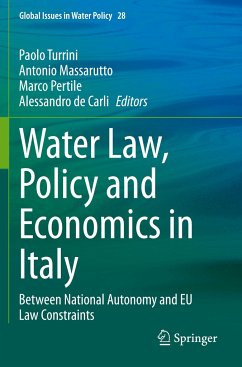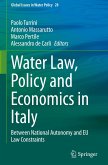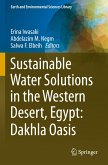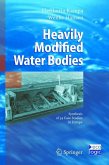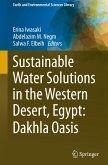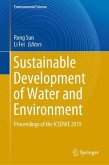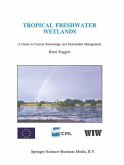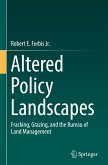Water Law, Policy and Economics in Italy
Between National Autonomy and EU Law Constraints
Herausgegeben:Turrini, Paolo; Massarutto, Antonio; Pertile, Marco; de Carli, Alessandro
Water Law, Policy and Economics in Italy
Between National Autonomy and EU Law Constraints
Herausgegeben:Turrini, Paolo; Massarutto, Antonio; Pertile, Marco; de Carli, Alessandro
- Broschiertes Buch
- Merkliste
- Auf die Merkliste
- Bewerten Bewerten
- Teilen
- Produkt teilen
- Produkterinnerung
- Produkterinnerung
This book provides the first comprehensive overview of the most important water-related issues that centre on Italy, analysed from several disciplinary perspectives - such as hydrology, economics, law, sociology, environmental sciences and policy studies - in order to promote full understanding of the challenges the country is facing and the ways it could best tackle them.
Despite the misconception that Italy is a water-scarce country, is in fact quite rich in water resources. Such resources, however, are unevenly distributed over the Italian territory. Italy's northern regions rely on…mehr
Andere Kunden interessierten sich auch für
![Water Law, Policy and Economics in Italy Water Law, Policy and Economics in Italy]() Water Law, Policy and Economics in Italy104,99 €
Water Law, Policy and Economics in Italy104,99 €![Sustainable Water Solutions in the Western Desert, Egypt: Dakhla Oasis Sustainable Water Solutions in the Western Desert, Egypt: Dakhla Oasis]() Sustainable Water Solutions in the Western Desert, Egypt: Dakhla Oasis128,39 €
Sustainable Water Solutions in the Western Desert, Egypt: Dakhla Oasis128,39 €![Heavily Modified Water Bodies Heavily Modified Water Bodies]() Eleftheria KampaHeavily Modified Water Bodies81,99 €
Eleftheria KampaHeavily Modified Water Bodies81,99 €![Sustainable Water Solutions in the Western Desert, Egypt: Dakhla Oasis Sustainable Water Solutions in the Western Desert, Egypt: Dakhla Oasis]() Sustainable Water Solutions in the Western Desert, Egypt: Dakhla Oasis90,99 €
Sustainable Water Solutions in the Western Desert, Egypt: Dakhla Oasis90,99 €![Sustainable Development of Water and Environment Sustainable Development of Water and Environment]() Sustainable Development of Water and Environment164,99 €
Sustainable Development of Water and Environment164,99 €![Tropical Freshwater Wetlands Tropical Freshwater Wetlands]() H. RoggeriTropical Freshwater Wetlands122,99 €
H. RoggeriTropical Freshwater Wetlands122,99 €![Altered Policy Landscapes Altered Policy Landscapes]() Robert E. ForbisAltered Policy Landscapes81,99 €
Robert E. ForbisAltered Policy Landscapes81,99 €-
-
-
This book provides the first comprehensive overview of the most important water-related issues that centre on Italy, analysed from several disciplinary perspectives - such as hydrology, economics, law, sociology, environmental sciences and policy studies - in order to promote full understanding of the challenges the country is facing and the ways it could best tackle them.
Despite the misconception that Italy is a water-scarce country, is in fact quite rich in water resources. Such resources, however, are unevenly distributed over the Italian territory. Italy's northern regions rely on quite an abundant quantity of freshwater, whereas in the southern area water endowment is limited. Moreover, climatic differences between North and South contribute to widen the divide. This disparity has notable consequences of socio-economic character, some of which, in turn, feed back into the environmental conditions of Italian regions: pollution, floods, landslides and droughts are among the problems affecting the country. There are numerous features of water use and consumption that distinguish Italy from other comparable countries, such as the significant role played by agriculture (a water-intensive activity), a lead position in the consumption of bottled water, lower-than-average prices of water and a far-from-optimal efficiency of waterworks. All such aspects, and many others, make Italy an essential case study.
Despite the misconception that Italy is a water-scarce country, is in fact quite rich in water resources. Such resources, however, are unevenly distributed over the Italian territory. Italy's northern regions rely on quite an abundant quantity of freshwater, whereas in the southern area water endowment is limited. Moreover, climatic differences between North and South contribute to widen the divide. This disparity has notable consequences of socio-economic character, some of which, in turn, feed back into the environmental conditions of Italian regions: pollution, floods, landslides and droughts are among the problems affecting the country. There are numerous features of water use and consumption that distinguish Italy from other comparable countries, such as the significant role played by agriculture (a water-intensive activity), a lead position in the consumption of bottled water, lower-than-average prices of water and a far-from-optimal efficiency of waterworks. All such aspects, and many others, make Italy an essential case study.
Produktdetails
- Produktdetails
- Global Issues in Water Policy 28
- Verlag: Springer / Springer International Publishing / Springer, Berlin
- Artikelnr. des Verlages: 978-3-030-69077-9
- 1st edition 2021
- Seitenzahl: 536
- Erscheinungstermin: 13. Mai 2022
- Englisch
- Abmessung: 235mm x 155mm x 27mm
- Gewicht: 900g
- ISBN-13: 9783030690779
- ISBN-10: 3030690776
- Artikelnr.: 63762612
- Herstellerkennzeichnung Die Herstellerinformationen sind derzeit nicht verfügbar.
- Global Issues in Water Policy 28
- Verlag: Springer / Springer International Publishing / Springer, Berlin
- Artikelnr. des Verlages: 978-3-030-69077-9
- 1st edition 2021
- Seitenzahl: 536
- Erscheinungstermin: 13. Mai 2022
- Englisch
- Abmessung: 235mm x 155mm x 27mm
- Gewicht: 900g
- ISBN-13: 9783030690779
- ISBN-10: 3030690776
- Artikelnr.: 63762612
- Herstellerkennzeichnung Die Herstellerinformationen sind derzeit nicht verfügbar.
Paolo Turrini (B.A. and M.A University of Bologna; Ph.D. University of Florence) is Assistant Professor of International Law at the Faculty of Law of the University of Trento. He is member of the editorial or scientific boards of the Italian Yearbook of International Law, the University of Bologna Law Review and Questions of International Law. His fields of expertise, or of main interest, are the history and theory of international law, international economic law and environmental law, especially water law. His publications include articles on virtual water, international trade in bulk water, and the EU water policy. Antonio Massarutto is Associate Professor of Applied Economics at the University of Udine and Research Fellow at GREEN, the research centre on Geography, Resources, Environment, Energy and Networks of Bocconi University, Milan, and SEEDS (an inter-university research centre on sustainability and environmental economics). His research activity isstrongly applied and policy-oriented, and is mainly focused on applied environmental economics, industrial organisation and regulation of network industries, the circular economy, water economics and policy, and waste management. He authored several publications, both in academic journals and addressed to the general public and the policy community. Marco Pertile is Associate Professor of International Law at the Faculty of Law and the School of International Studies of the University of Trento. He is co-director of the journal Questions of International Law and member of the Editorial Committee of the Italian Yearbook of International Law. He teaches a course on Human Rights and Natural Resources at the Paris School of International Affairs of Sciences Po, and has previously taught, in Geneva, at the Graduate Institute of International and Development Studies and at the Academy of International Humanitarian Law and Human Rights. His research interests include the international law of natural resources, the law of armed conflicts and human rights law. Alessandro de Carli is Research Fellow at GREEN, the research centre on Geography, Resources, Environment, Energy and Networks of Bocconi University, Milan. He is also the director of the AquaLAB Foundation, a multidisciplinary research centre on water resources and water services. From 2008 to 2013, he coordinated the Master in Green Management, Energy and Corporate Social Responsibility (MaGER) at Bocconi University. He is one of the founding members of the Italian Association of Environmental Engineers (AIAT). He carries out his research and consultancy activities in the field of ecological economics applied to water resources, in order to combine territorial development with the protection of environmental resources.
Chapter 1. Introduction (Paolo Turrini et al.).- Part 1. Water Resources and Their Use and Management in Italy .- Chapter 2. Water Resources of Italy (Marcello Benedini, Giuseppe Rossi).- Chapter 3. Coping with Floods in Italy: Learning from the Past to Plan Future Adaptation (Renzo Rosso).- Chapter 4. The Uses and Value of Water in Italy: Evidence from Selected Case Studies in Italy, with a Particular Focus on Irrigation, Industry and Hydropower (Giulia Vaglietti et al.).- Chapter 5. Testing the Waters: A Sociological Analysis of Domestic Water Use and Consumption (Filippo Oncini, Francesca Forno).- Chapter 6. Water Resources Management in Italy: Institutions, Laws and Approaches (Emanuele Boscolo).- Part 2. Water Management and Environmental Concerns.- Chapter 7. Water-Dependent Ecosystems in Italy (Riccardo Santolini et al.).- Chapter 8. Water Quality Control Policies and the Criminalisation of Pollution (Giovanni De Santis, Matteo Fermeglia).- Chapter 9. Managing Water Scarcity and Droughts: The Po Experience (Antonio Massarutto, Dario Musolino).- Chapter 10. The Management of International River Basins: The Case of Transboundary Water Cooperation Between Italy and Its Neighbours (Mara Tignino, Benedetta Gambatesa).- Chapter 11. The Italian Virtual Water Trade and Water Footprint of Agricultural Production: Trends and Perspectives (Stefania Tamea et al.).- Part. 3. The Provision of Water and Sanitation Services.- Chapter 12. The Human Right to Water in Italy's Foreign Policy and Domestic Law (Paolo Turrini, Marco Pertile).- Chapter 13. The Permanent (De-) Institutionalisation of Multi-Level Governance of Water Services in Italy (Giulio Citroni, Andrea Lippi).- Chapter 14. The Integrated Water Service in the Italian LegalSystem Between Solidarity and Competition: An Overview (Vera Parisio).- Chapter 15. The Evolution of the Italian Water and Wastewater Industry in the Period 1994-2018 (Donato Berardi et al.).- Part 4. The Implementation of the EU Water Framework Directive and the EU Floods Directive.- Chapter 16. Water Governance in Italy: From Fragmentation to Coherence Through Coordination Attempts (Mariachiara Alberton).- Chapter 17. A Practitioners' View on the Application of the Water Framework Directive and the Floods Directive in Italy (Marta Martinengo et al.).- Chapter 18. Economic Regulation, Water Pricing, and Environmental and Resource Costs: The Difficult Marriage Between Financial Sustainability, Investment Requirements and Economic Efficiency (Antonio Massarutto).- Chapter 19. .Environmental and Resource Costs Assessment and the Case for Reforming the Italian System of Water Abstraction Charges (Vito Frontuto et al.).- Chapter 20. Public Participation in the Implementation in Italy of the Water-Related Directives (Elena Fasoli et al.).- Part 5. Conclusion: A View on Italy from Within and from the Outside.- Chapter 21. A View from the Outside: What Italy Can Learn and Teach in the Field of Water Policy.- Chapter 22. A View from Within: Concluding Remarks.
Chapter 1. Introduction (Paolo Turrini et al.).- Part 1. Water Resources and Their Use and Management in Italy .- Chapter 2. Water Resources of Italy (Marcello Benedini, Giuseppe Rossi).- Chapter 3. Coping with Floods in Italy: Learning from the Past to Plan Future Adaptation (Renzo Rosso).- Chapter 4. The Uses and Value of Water in Italy: Evidence from Selected Case Studies in Italy, with a Particular Focus on Irrigation, Industry and Hydropower (Giulia Vaglietti et al.).- Chapter 5. Testing the Waters: A Sociological Analysis of Domestic Water Use and Consumption (Filippo Oncini, Francesca Forno).- Chapter 6. Water Resources Management in Italy: Institutions, Laws and Approaches (Emanuele Boscolo).- Part 2. Water Management and Environmental Concerns.- Chapter 7. Water-Dependent Ecosystems in Italy (Riccardo Santolini et al.).- Chapter 8. Water Quality Control Policies and the Criminalisation of Pollution (Giovanni De Santis, Matteo Fermeglia).- Chapter 9. Managing Water Scarcity and Droughts: The Po Experience (Antonio Massarutto, Dario Musolino).- Chapter 10. The Management of International River Basins: The Case of Transboundary Water Cooperation Between Italy and Its Neighbours (Mara Tignino, Benedetta Gambatesa).- Chapter 11. The Italian Virtual Water Trade and Water Footprint of Agricultural Production: Trends and Perspectives (Stefania Tamea et al.).- Part. 3. The Provision of Water and Sanitation Services.- Chapter 12. The Human Right to Water in Italy's Foreign Policy and Domestic Law (Paolo Turrini, Marco Pertile).- Chapter 13. The Permanent (De-) Institutionalisation of Multi-Level Governance of Water Services in Italy (Giulio Citroni, Andrea Lippi).- Chapter 14. The Integrated Water Service in the Italian LegalSystem Between Solidarity and Competition: An Overview (Vera Parisio).- Chapter 15. The Evolution of the Italian Water and Wastewater Industry in the Period 1994-2018 (Donato Berardi et al.).- Part 4. The Implementation of the EU Water Framework Directive and the EU Floods Directive.- Chapter 16. Water Governance in Italy: From Fragmentation to Coherence Through Coordination Attempts (Mariachiara Alberton).- Chapter 17. A Practitioners' View on the Application of the Water Framework Directive and the Floods Directive in Italy (Marta Martinengo et al.).- Chapter 18. Economic Regulation, Water Pricing, and Environmental and Resource Costs: The Difficult Marriage Between Financial Sustainability, Investment Requirements and Economic Efficiency (Antonio Massarutto).- Chapter 19. .Environmental and Resource Costs Assessment and the Case for Reforming the Italian System of Water Abstraction Charges (Vito Frontuto et al.).- Chapter 20. Public Participation in the Implementation in Italy of the Water-Related Directives (Elena Fasoli et al.).- Part 5. Conclusion: A View on Italy from Within and from the Outside.- Chapter 21. A View from the Outside: What Italy Can Learn and Teach in the Field of Water Policy.- Chapter 22. A View from Within: Concluding Remarks.

